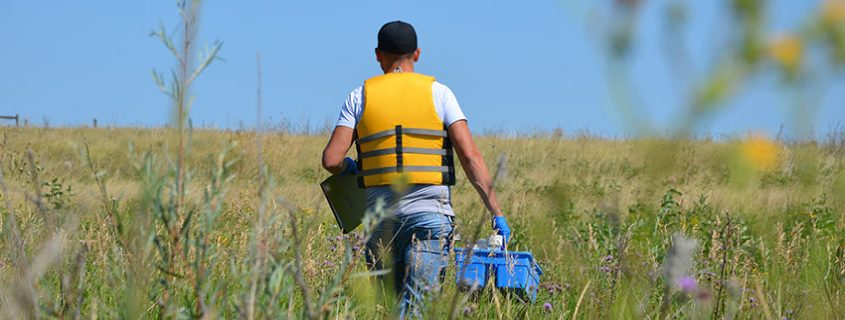Click on a practice area for details.
Common to Agriculture, Environment, Life Sciences, and Food
Common All
Involves all aspects of business management, including:
- Acquisition of investment capital
- Marketing and market development
- Management of supply chains
Involves education rather than applied practice, including:
- Classroom education or long-distance education associated with a variety of universities and colleges
- Extension activities and information sharing to government and/or industry personnel, landowners and primary producers
Involves management rather than technical practice, including:
- Project management
- Human resource management
- Budgeting
- Policy and program development
- Strategic planning
Involves work with a diverse group of technical consultants and staff to ensure that project objectives are on time and on budget
Activities:
- Project development
- Planning
- Initiation controlling and reporting
Operates within a regulatory environment
Many who work in this area have expertise in legislation and regulatory requirements
Regulatory support for clients includes consultation in support of development applications and approvals required under legislation such as:
- The Water Act
- Environmental Protection and Enhancement Act
- Agricultural Operations and Practices Act
Activities:
- Environmental impact assessments
- Pre-disturbance assessments
- Conservation and reclamation plans
- Reclamation certificate acquisition
- Public hearings
- Open houses
Involves research and development of technologies to enhance the management of agricultural and environmental resources
Involvement may be direct or indirect
Research may be pure research or applied research focusing on a variety of agrology-related interests
Common to Agriculture and Environment
Common AE
Involves evaluating the effect of different agricultural and industrial facilities on air quality, terrestrial and aquatic ecosystems, and human health and well-being
Expertise:
- Managing odour issues associated with intensive livestock operations
- Effects of acid-generating airborne substances on soil and vegetation
Core knowledge areas:
- Biochemistry
- Microbiology
- Soil chemistry and fertility
Activities:
- Manage various agricultural, industrial and municipal waste streams
- Develop land application plans of various waste products (i.e. manures, biosolids)
- Monitor and assess soil chemical, physical and biological properties
- Develop policies and programs
- Develop and manage compost
- Odour control
Involves agricultural design
Activities:
- Advise on the use of buildings, structures, machinery and equipment
- Advise on the development, management and use of waste treatment and ecological systems
Involves the collection, analysis and representation of spatial data, used to assist other professionals with:
- Biophysical resource inventories
- Pre-disturbance assessments
- Environmental impact mitigation planning
- Vegetation/soil management and conservation
- Reclamation planning
- Environmental monitoring
- Nutrient management
- Crop pest spatial analyses and management
- Socio-economic impact assessments
Agrology professionals in this area may work for:
- Environmental impact assessments related to linear developments
- Oil and gas site developments
- Intensive livestock operations
- Precision agricultural management
Involves a number of scientific core knowledge areas related to greenhouse gases
Activities:
- Evaluate farm gate greenhouse gas sources and sinks
- Develop sampling plans to monitor and verify success of c-sequestration in agricultural and non-agricultural soils
- Evaluate wetland sources and sinks
- Devise management strategies to reduce greenhouse gas emissions
Involves providing government and/or industry with laboratory support
Activities:
- Sample management
- Sample preparation and analysis
- Instrumental analysis
- Database management
- Quality assurance and quality control process development and implementation
- Reporting
Involves negotiating lease agreements between landowners and companies that want to build infrastructure like well pads, access roads, pipelines, and compressor stations
Expertise:
- Land use issues
- Land evaluation systems
- Land economics
- Agricultural production systems
- Contract development
- Negotiation
Involves identification and management of pests, including weeds, insects and disease
Focuses on crop and vegetation protection through the application of pest control products and/or bio-control principles
Agrology professionals in this area include:
- Weed scientists
- Entomologists
- Plant pathologists
Core knowledge areas:
- Botany
- Vegetation ecology
- Soil science
- Animal science
Activities:
- Rangeland inventories involving the identification of vegetation, range conditions, carrying capacity, soil types, utilization patterns, topography and streams
- Infrastructure improvements such as roads, watering points and fences
- Rangeland monitoring and assessment of ecosystem health
- Rangeland reclamation
- Assess wildlife habitats
- Develop conservation and management plans
- Develop policies and programs
Core knowledge areas:
- Soil chemistry and fertility
- Plant nutrition and physiology
- Landscape pedology
Activities:
- Sample and monitor programs for fertility evaluation
- Develop nutrient management plans for cropping systems
- Consult with producers
- Laboratory analysis
- Sample handling
- Fertilizer manufacture and sales
Core knowledge areas:
- Wetland and vegetation ecology
- Soil and plant taxonomy
- Surface and subsurface hydrology
Activities:
- Wetland and riparian ecosystem inventories
- Monitoring and health assessment
- Policies and programs for wetland and riparian areas
- Wetland compensation assessments








